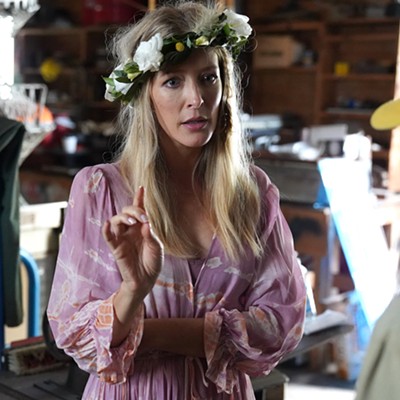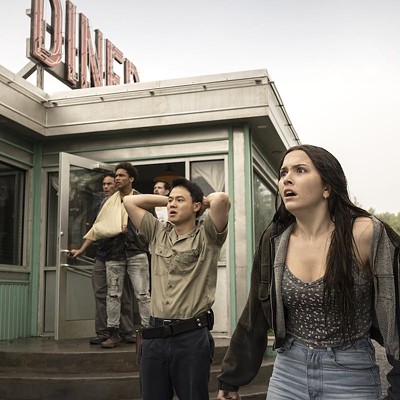It’s hard to notice amid Trailer Park Boys’ prominence, but Mike Clattenburg’s series never took the easy route. At the end of the 1990s, trailer trash culture had reached a gross trend in hipster fashion, movies and magazines—spoiled white kids condescending to lifestyles they’d never come in contact with. Trailer Park Boys’ success came despite Clattenburg’s refusal of social class stereotypes. It isn’t about mullet jokes: the series invests in these aspiring small time criminals’ dreams.
Contrary to rumour, the big screen version doesn’t cover old ground or reinvent the show’s backstory. It picks up in Sunnyvale Trailer Park as the boys plot a robbery of a container of change on display at a nearby movie theatre (that’s Empire Bayers Lake). Switching to real film stock for the big screen should expand the size of this world, but Clattenburg curiously tries to have it match the series’ grungy feel. Of series turned into movies during their TV run, only South Park really built upon its origins to something substantially new. Although most of the acting takes a step up, Trailer Park Boys: The Movie is basically a longer episode of the show that spawned it.
In most respects, this isn’t a bad thing. Clattenburg’s verite approach to sitcoms has always had a left-field cinematic quality. The characters propel the comedy, and Clattenburg understands how to define them with behavioural details. Bubbles singing along to the Vogue Optical theme is priceless. There are big laughs throughout, although the first act is the funniest. Mostly, Trailer Park Boys’ offbeat charm comes from its appropriation of the outrageous antics of US comedies with low-key Canadiana. It’s like Goin’ Down the Road crossed with Caddyshack.
The Science of Sleep
Michel Gondry is a pop culture scientist. He approaches each project as though he just discovered a new math formula. He’s one filmmaker who has really earned the title of genius, but more for his short form films than his dramatic features. Human Nature (2001) never found a shape beneath all its ideas, and the better Eternal Sunshine of the Spotless Mind too often underlined its whimsy.
The Science of Sleep is Gondry’s loosest, most confident movie journey into the imaginative mind. Its purity comes largely from hero Stephane (Gael Garcia Bernal) as stand-in for the writer-director himself. At his mother’s promise of a creative job for a calender company, Stephane moves to Paris. His constant dreaming—which makes him uncertain of when he’s awake—keeps him distracted from the boredom of the job he’s actually handed. But artistic neighbour Stephanie (Charlotte Gainsbourg) puts up with Stephane’s strangeness.
Gondry isn’t interested in making a puzzle by obscuring the line between reality and dreams. It’s a conflation that presents real life lived imaginatively—the concept of adulthood holding onto childhood possibility that Wes Anderson got to in The Life Aquatic. The Science of Sleep indulges in a free-form playfulness. Stephane and Stephanie size up their liberties like the boys and girls in Godard’s Masculin, feminin. Gondry’s French New Wave film remains inside its protagonist’s head. Stephane’s most noteworthy invention is a time machine that can travel only one second into the past and future.
Gondry asks if artistic creativity is far removed from insanity. With the work this director’s been doing, he has a ways to go before losing touch.
For showtimes see movie times. Get in touch. write: [email protected]











